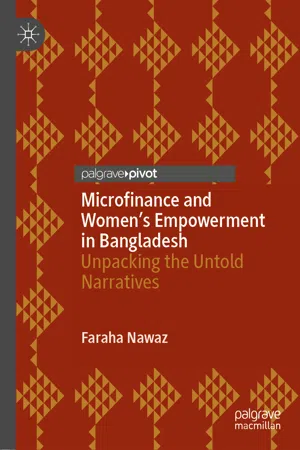This book is an ethnographic study of microfinance nongovernmental organizations and women’s empowerment in Bangladesh . It examines the effects of policies and practices of microfinance NGOs on empowerment of rural women in Bangladesh . The book begins with the background of emergence of NGOs and its operational context in Bangladesh so that the reader can understand the importance of writing a book on this topic.
Of the 168 million people in Bangladesh , almost half of it are women. Yet, historically the country has been overly male-dominated and “traditional forms of social and family relationships based on age-old religious norms and taboos have denied women status and power, rights and privileges” (Zafarullah 2000: 201). This is a country that restricts women to undertaking purely reproductive roles or sometimes productive roles that can be carried out largely within the home. Women’s domestic and family work is essential, yet it is unpaid, ignored and rarely considered to be of the same value as work that is primarily undertaken by men (Efroymson et al. 2007: 28). The patriarchal culture and social norms place them in a position of subordination and oppression in their families, neighborhoods and communities . Their upbringing trains them to be good mothers and wives and to perform all household chores perfectly. In Bangladesh , women are expected to live and stay in their husbands’ homes when they marry. This is often a long distance from where they were born and grew up and they are treated with very little respect (Kabeer et al. 2013: 2).
Traditionally, Bangladeshi women have been illiterate and poor, subject to social and religious sanctions and, therefore underprivileged, disadvantaged and often marginalized. Women’s compliance to men’s control and directions are institutionalized and their material needs largely denied or determined by decisions made by the latter (Nosaka and Andrews 2004). Moreover, they are raised with messages that convey their lack of value and capability in comparison with men. Although the Prime Minister and the opposition leader of Bangladesh are women, the representation of women in both the cabinet and parliament is not more than 10%. Women are not motivated to engage in local politics due to poor education , limited monetary support, limited mobility and lack of knowledge about the electoral and political processes (Habib and Jubb 2012).
As women of the country comprise half of the total population and the development of the country will not progress unless they are fully involved in the development process. In order to be rid of the curse of poverty and to progress development, male supremacy and the oppression and domination of women need to cease, and strategies must be put in place to advance the empowerment process from the household to the state level. Neither the government of the Bangladesh nor the market has been able to advance development through empowerment of women (Goswami 1998). However, on the bright side, the failure of the Government and market paves the way of flourishing mushroom growth of NGOs in Bangladesh . When NGOs began operating, one of the experimental tools being applied by NGOs was to empower impoverished women by offering them collateral -free loans called ‘microfinance’. Poor women, previously excluded from the conventional banking systems and with no or little access to financial services are now being extended support in the form of small-scale loans to undertake micro-enterprises at the individual or small-group levels.
Growth of NGOs in Bangladesh
The NGOs have become extensively discussed issue in third world countries in general and Bangladesh in particular. Although NGOs have recently gained prominence in development discourse , they are not a recent phenomenon. These groups ceased to exist once the situation improved. They shared an ethical value of taking care of their Proja1 in distress (Ahmed 1999: 12). Gradually efforts were made primarily by Christian missionaries to institutionalize the charity work and social welfare activities in Bangladesh . They often set up hospitals, schools, orphanages and so forth in remote and poverty -stricken areas. Many such centers have now been in operation for over hundred years and have progressively become known as NGOs . In the pre-liberation period, most of the NGOs were missionaries from other countries. Of these, one of the longest operating was organized by the Baptist Missionary Society and it has been in existence since 1794. The longest running local NGO is the Kumudini Welfare Trust, which began its operation in 1944 (Ahmed 1999: 11).
Although NGOs have been working in traditional ways since the British colonial period, they radically transformed their role after the
Bangladesh Liberation War of 1971. This nine-month war devastated the country, causing extensive destruction to the physical, social and economic infrastructure. The Government faced the uphill task of providing aid to the war-affected people and rehabilitating the damaged infrastructure. During this time, a
number of NGOs emerged to respond to the massive need for relief and rehabilitation
activities . The following quote from Ahmed (
1999: 12) captures this:
There could be no mistaking the needs following the devastating natural disasters in 1970 and the war of liberation which left a shattered economy and infrastructure and millions of refugees but at the same time, a resolute new nation which the people would build together. NGOs were requested to respond to the efforts at relief, rehabilitation and national reconstruction and respond they did. A large number of international NGOs and voluntary organizations extended their helping hands to assist Bangladesh .
Primarily, NGOs emerged as charitable and voluntary organizations . Over time, their activities slowly transitioned from relief and rehabilitation to developing welfare programs to promote development by introducing microcredit schemes (Korten 1991). NGOs have now become the main providers of microcredit2 in Bangladesh . Collateral -free microcredit programs have been the main catalyst for alleviating poverty a...
